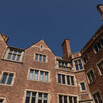South African Justice Edwin Cameron to Deliver Anderson Lecture October 20
Edwin Cameron, Justice of the Constitutional Court of South Africa, will deliver the 2013-2014 Robert P. Anderson Memorial Lecture on October 20 at Yale Law School.
The lecture, titled “Appellate Power and Constitutional Transformation,” will begin at 4:30 pm in the faculty lounge.
Cameron has been a Justice of South Africa’s highest court, the Constitutional Court, since January 2009. Previously, he was a judge of the Supreme Court of Appeal for eight years. Cameron served as a human rights lawyer during apartheid. President Mandela appointed him a judge in 1994.
Cameron was an outspoken critic of President Mbeki’s AIDS-denialist policies and his prize-winning memoir, Witness to AIDS, has been published in South Africa, the UK, the U.S., and is translated into German and Chinese. His latest book, Justice: A Personal Account, was published in February 2014.
Cameron’s lecture will discuss how the South African Constitution served as the “centerpiece attainment” of the negotiations that brought a formal end to apartheid 20 years ago.
“It emerged from a long struggle for justice and dignity within the legal system that persisted even in the darkest hours of racial oppression, and committed South Africans to a process of profound legal transformation,” said Cameron. “The most radical innovation of the new era was constitutional supremacy. At the end of two decades, the Constitutional Court has established its authority as the key institution in securing the legitimacy of the Constitution and the continuing power of its values. The Court has used its appellate power over a wide field to secure practical impact for constitutional values.”
The lecture will look at specific instances that illustrate this with particular vividness — social and economic rights; sexual orientation and gender identity; and access to anti-retroviral treatment.
“These instances show how the Constitution seeks to confer moral citizenship, a person’s sense that he or she is a fully entitled member of society,” said Cameron. “Much of the Court’s achievement since 1994 has consisted in the process of asserting the moral citizenship of our country’s people. This has been especially significant in a society that, under apartheid, was defined by exclusion, division, subordination, condemnation and stigma.”
The Anderson Lecture was established by former law clerks and friends in memory of Robert P. Anderson, B.A. 1927, LL.B. 1929, Senior Judge for the U.S. Court of Appeals for the Second Circuit.


